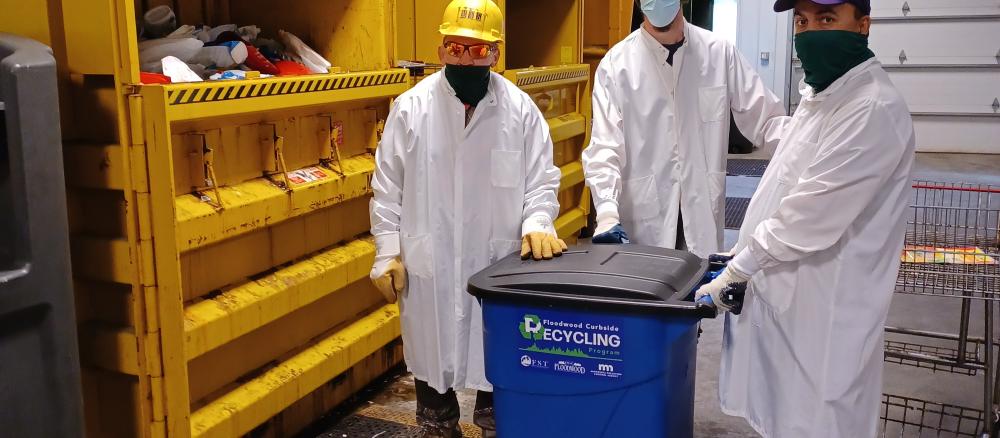The work of recycling represents more than 60,000 jobs in Minnesota, paying almost $3.4 billion in wages and adding nearly $15.7 billion to the state's economy. But each year, Minnesotans are still throwing away more than 850,000 tons of recyclables with an estimated value of $153 million. Rather than fueling the state's economy, that material is filling up landfills and incinerators.
For the past several years, the MPCA has awarded grants to counties, cities, townships, and tribal communities for projects that improve recycling and composting in Greater Minnesota. Here's how some of that money is being used to boost the recovery of valuable recyclables.
Recovering useable materials in Becker County
Becker County has seen significant new building construction over the past several years. As a result, building materials from demolition work are ending up in municipal waste. It was hard to sort out recyclable and reusable material from the waste delivered to the Becker County solid waste campus.
The county received $276,000 from the MPCA to install equipment for separating material that can be recycled or reused from waste to be landfilled or incinerated. The equipment allows staff to sort out about 50% of the demolition waste stream and capture materials such as plastic film, vinyl siding, and sheet rock for recycling. Becker County estimates that each year, it's saving $105,000 and reducing its greenhouse gas emissions by more than 1,300 tons.
Because the equipment increasing the facility's capacity and processing capability, Becker County partnered with Better Futures Minnesota and the Natural Resources Research Institute at the University of Minnesota – Duluth to further divert household goods and building materials from the landfill. The Becker County Waste Diversion and Material Reuse Pilot project included four events where materials diverted from the waste stream were offered to local citizens for purchase. More than 14,000 pounds of material, consisting of 572 items were diverted and sold. This pilot project went on to win the 2021 Environmental Initiative Award in the “Rural Vitality” category.
“With this project, we wanted to demonstrate the significant, multiple benefits of diverting household goods and building materials from the landfill,” says Sandy Gunderson, regional household hazardous waste and recycling coordinator for Becker County. “Within a short timeframe, this effort demonstrated a strong demand for reused and repaired goods in the local community, and we want to thank the MPCA for their continued support in our efforts.”
Increasing compost capacity of the Grand Portage Band of Lake Superior Chippewa
The Grand Portage Band of Lake Superior Chippewa received an MPCA grant for more than $69,000 to purchase and install an in-vessel composter to capture food waste on the Grand Portage Reservation. Composting reclaims food waste that would otherwise take up landfill space and add to greenhouse gas (methane) emissions. Instead, the Grand Portage food waste will create compost to amend the soil at the tribe's community gardens as part of a sustainable food initiative.
The composter began operations in spring 2020. Some households have been contributing food waste to the composter, but the majority (5-10 gallons a week) comes from the Oshki Charter School and the Elderly Nutrition Program. The Grand Portage Lodge and Casino will also utilize the composter once its facility is fully operational again; operations were cut back due to the COVID-19 shutdown. Overall, the project diverted approximately 400 gallons of food waste from the landfill in its first year.
Expanding recycling in Floodwood
The City of Floodwood has partnered with Floodwood Services and Training, a nonprofit providing day and employment supports to individuals with disabilities, to provide recycling services to its community for many years. But the small program wanted to expand its recycling capabilities, keep useable materials out of landfills and incinerators, conserve the energy and resources use to make the materials, and create jobs in the community.
The MPCA recently provided more than $210,000 to help expand the curbside recycling program. The new funding will support:
- Curbside pickup and receptacles for city residents
- An additional baler/compactor for recyclables
- A mechanical can crusher
- Community education on recycling practices
“Floodwood Services and Training is honored that the MPCA chose to invest in the City of Floodwood’s partnership with us to expand recycling in our small community,” says Dawn Lamping, Floodwood Services and Training program administrator. “This funding assists us in searching out new markets, adding additional equipment to the recycling operation, bringing curbside receptacles to the city, as well as educating the community in good recycling practices.”
Each year, the project is projected to reduce annual solid waste by more 170,000 pounds and reduce greenhouse gas emissions by more than 400 metric tons, the equivalent of taking about 1,037 cars off the road.
